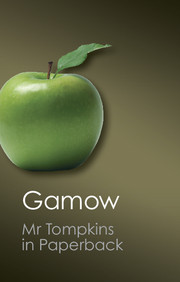Book contents
- Frontmatter
- Dedication
- Foreword
- Preface
- Contents
- Acknowledgements
- INTRODUCTION
- 1 City Speed Limit
- 2 The Professor's Lecture on Relativity which caused Mr Tompkins's dream
- 3 Mr Tompkins takes a holiday
- 4 The Professor's Lecture on Curved Space, Gravity and tne universe
- 5 The Pulsating Universe
- 6 Cosmic Opera
- 7 Quantum Billiards
- 8 Quantum Jungles
- 9 Maxwell's Demon
- 10 The Gay Tribe of Electrons
- 10½ A Part of the Previous Lecture which Mr Tompkins slept through
- 12 Inside the Nucleus
- 13 The Woodcarver
- 14 Holes in Nothing
- 15 Mr Tompkins Tastes a Japanese Meal
2 - The Professor's Lecture on Relativity which caused Mr Tompkins's dream
Published online by Cambridge University Press: 05 August 2014
- Frontmatter
- Dedication
- Foreword
- Preface
- Contents
- Acknowledgements
- INTRODUCTION
- 1 City Speed Limit
- 2 The Professor's Lecture on Relativity which caused Mr Tompkins's dream
- 3 Mr Tompkins takes a holiday
- 4 The Professor's Lecture on Curved Space, Gravity and tne universe
- 5 The Pulsating Universe
- 6 Cosmic Opera
- 7 Quantum Billiards
- 8 Quantum Jungles
- 9 Maxwell's Demon
- 10 The Gay Tribe of Electrons
- 10½ A Part of the Previous Lecture which Mr Tompkins slept through
- 12 Inside the Nucleus
- 13 The Woodcarver
- 14 Holes in Nothing
- 15 Mr Tompkins Tastes a Japanese Meal
Summary
Ladies and Gentlemen:
In a very primitive stage of development the human mind formed definite notions of space and time as the frame in which different events take place. These notions, without essential changes, have been carried forward from generation to generation, and, since the development of exact sciences, have been built into the foundations of the mathematical description of the universe. The great newton perhaps gave the first clear-cut formulation of the classical notions of space and time, writing in his Principia:
‘Absolute space, in its own nature, without relation to anything external, remains always similar and immovable;’ and ‘Absolute, true and mathematical time, of itself, and from its own nature, flows equably without relation to anything external.’
So strong was the belief in the absolute correctness of these classical ideas about space and time that they have often been held by philosophers as given a priori, and no scientist even thought about the possibility of doubting them.
However, just at the start of the present century it became clear that a number of results, obtained by most refined methods of experimental physics, led to clear contradictions if interpreted in the classical frame of space and time.
- Type
- Chapter
- Information
- Mr Tompkins in Paperback , pp. 9 - 18Publisher: Cambridge University PressPrint publication year: 2012

